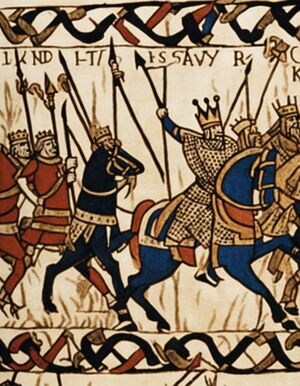Pericles the Conqueror
This article is incomplete because it is pending further input from participants, or it is a work-in-progress by one author. Please comment on this article's talk page to share your input, comments and questions. Note: To contribute to this article, you may need to seek help from the author(s) of this page. |
| Pericles the Conqueror | |
|---|---|
| King of the Saxenders | |
 Pericles the Conqueror depicted in the Tapestry of Kings. preparing to lay siege to the Hældemouthian town of Æthelœsburh | |
| King of the Saxenders | |
| Reign | c. 2812 – 2787 BL |
| Predecessor | Prokopis the Stabiliser |
| Successor | Minas the Diplomat |
| King of Hældemouth | |
| Reign | c. 2803 – 2787 BL |
| Predecessor |
|
| Successor | Minas the Diplomat |
| King of Epidedon | |
| Reign | c. 2795 – 2787 BL |
| Predecessor | Cleathes the Defeated |
| Successor | Minas the Diplomat |
| Born | c. 2832 BL Constanapolis |
| Died | c. 2787 BL 2787 (aged 44–45) Constanapolis |
| Burial | |
| Spouse | Michaela |
| Issue | |
| Dynasty | Prokopisian Dynasty |
| Father | Prokopis the Stabiliser |
| Mother | Magda |
| Religion | Saxendish Paganism |
| Part of a series on |
| the Saxenders |
|---|
 |
Pericles the Conqueror (c. 2832-2787 BL), often referred to as Pericles the Ruthless for his expensive military campaigns, was the 4th king of the Saxenders from 2812 BL upon his father's death, king of Hældemouth from 2803 BL following the Saxendish Conquest of Hældemouth, and King of Epidedon from 2795 BL following the Short War until his death in 2787 BL. By 2810, following a grueling struggle of claims to the throne of Saxendia between Pericles and his second cousin Orythroneous the Traitor, Pericles had secured his right to the throne and had Orythroneous executed. In 2805, following the death of Hældemouthian king Wealhhere Chalender II, Pericles invaded Hældemouth, leading an army of Saxenders to victory over the Hælde-Marlseigh of Wealhhere Chalender III, and subsequently oppressed Hældemouthian revolts in what is now known as the Saxendish Conquest of Hældemouth.
Pericles also went on a costly military campaign against Epidedon, surrounding them on all sides and cutting off supply routes. His own military group razed several towns and plundered goods from the nation, massacring hundreds of denizens and soldiers, as well as setting up segregated cemetaries that were divided between his own soldiers, who had gravestones decorated with flowers, and the graves of the enemy, who received sandstone gravestones that were undecorated. Following the conquest, he chose to entirely suppress the people of Epidedon, leading to several revolts, some of which gained traction before being put down.